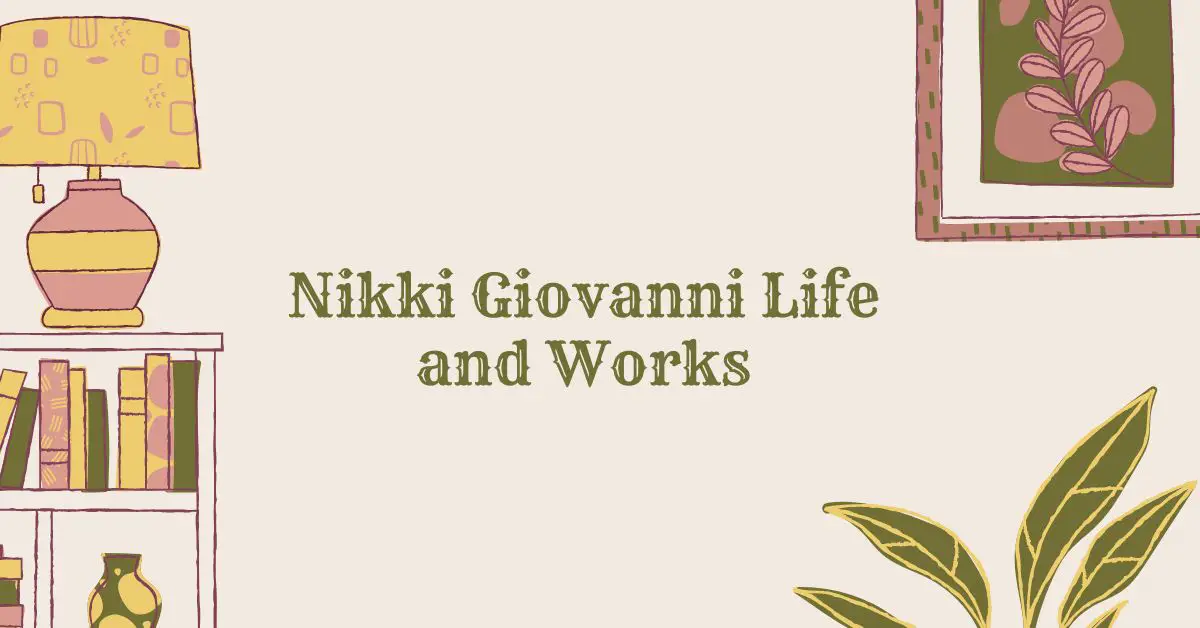Early Life and Education
Nikki Giovanni is a renowned American poet, writer, and activist who has been a prominent figure in the Black Arts Movement. Born on June 7, 1943, in Knoxville, Tennessee, she was the youngest of three children born to Yolande Cornelia Sr. and Jones Giovanni. Her father was a Presbyterian minister, and her mother was a schoolteacher.
She grew up in Cincinnati, Ohio, and attended the all-black Fisk University. She later earned her bachelor’s degree in history from Antioch College. In the early 1970s, Giovanni became a professor of English at Virginia Tech, where she taught creative writing and literature. She has taught at several other universities, including Rutgers University and Ohio State University. She is currently a professor of creative writing at Virginia Tech.
Nikki Giovanni Writing Career
Giovanni began her writing career in the late 1960s, and her early works focused on the civil rights movement and the Black Power movement. She has written over thirty books of poetry, including “Black Feeling, Black Talk” (1968), “Black Judgment” (1968), and “Quilting the Black-Eyed Pea” (2002). Giovanni’s first book of poetry, Black Feeling, Black Talk, was published in 1968 and was followed by Black Judgment in 1969.
These early works established her as an important voice in the Black Arts Movement, a cultural and political movement that sought to celebrate and promote African American art and literature. She has also written several children’s books and several works of non-fiction.
In the 1970s, Giovanni continued to produce a steady stream of poetry collections, including Re: Creation (1970), My House (1972), and Gemini: An Extended Autobiographical Statement on My First Twenty-Five Years of Being a Black Poet (1972). She also published several children’s books, including Spin a Soft Black Song (1971) and Vacation Time: Poems for Children (1980).
Giovanni’s later works have focused on issues of gender, sexuality, and personal relationships. Her poetry collections The Women and the Men (1975) and Love Poems (1997) explore these themes in depth. She has also written many non-fiction works, including the memoir Gemini: An Extended Autobiographical Statement about My First Twenty-Five Years of Being a Black Poet (1972) and the political essay collections Racism 101 (1994) and The Nikki Giovanni Poetry Collection (1996).
Nikki Giovanni’s Writing Style
Giovanni’s writing style is characterized by its raw, emotional intensity and focus on race, identity, and social justice issues. She often employs a rhythmic, musical quality in her poems, and her work is known for its accessibility and reliability to a wide audience. Throughout her career, Giovanni has been known for her bold and powerful writing, which often incorporates spoken word and rap elements.
She is known for her use of imagery and metaphor, and her work often addresses the struggles and triumphs of African Americans. She often uses her experiences as a black woman in America to explore race, identity, and social justice themes. Her poetry is often rhythmic and musical, and she often uses repetition and imagery to create a sense of urgency and emotional intensity.
In addition to her writing, Giovanni has been an active voice for social justice and activism. She has been a vocal advocate for women’s rights, civil rights, and LGBTQ+ rights and has been involved in numerous political and community organizations throughout her career. She has also been a dedicated educator, teaching creative writing at universities across the country
Her Legacy
Giovanni’s legacy is one of activism and social justice. She has been involved in various political and social causes throughout her career, and she has been a vocal advocate for issues such as civil rights, women’s rights, and environmental justice. She has received numerous awards and honors for her work, including the Langston Hughes Medal and the NAACP Image Award.
Giovanni’s impact on the literary world has been immense, and she has been recognized with numerous awards and accolades. In 1998, she was named the first woman to win the Langston Hughes Medal for her contributions to African American literature. She has also been honored with the National Book Award, the NAACP Image Award, and the National Medal of Arts.
Giovanni’s legacy as a writer and activist continues to be celebrated today. Her work continues to inspire and empower readers, and her impact on the literary world is immeasurable. She is a true icon, and her contributions to literature and social justice will be remembered for generations to come.
Suggested Readings


